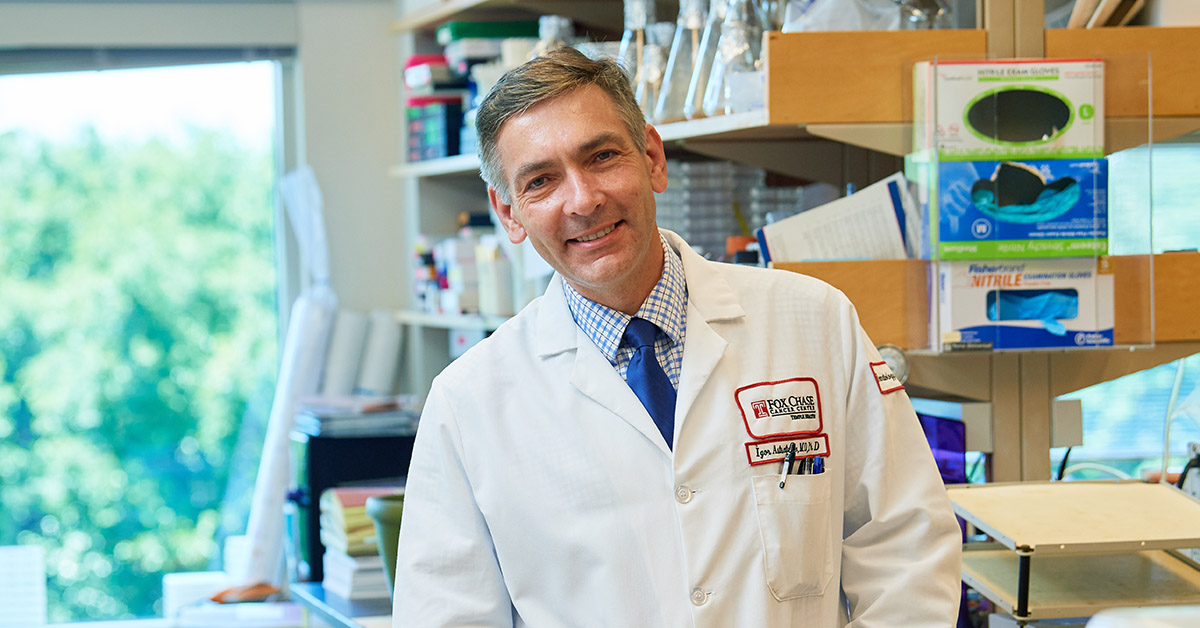
PHILADELPHIA (January 5, 2022)— Researchers at Fox Chase Cancer Center recently received a $497,000 multi-year grant from the National Cancer Institute within the National Institutes of Health to develop a way to evaluate novel drug therapies in patients with pancreatic cancer.
“There are very few biologically deep studies in pancreatic cancer where we use ex-vivo patient material to understand biology, so we decided to figure out a way to do it,” said Igor Astsaturov, MD, PhD, associate professor in the Department of Hematology/Oncology and a co-director of the Marvin & Concetta Greenberg Pancreatic Cancer Institute at Fox Chase.
Astsaturov said the long-term goal of this study is to establish an investigative platform in which a patient’s tumor is studied in-depth to determine its composition and understand what happens to a tumor after treatment. Having this platform, he said, will allow researchers to apply this method to any therapeutic investigational drug that may be beneficial.
“We wanted to come up with any potential treatment that could be useful and test whether it does what it’s supposed to do. We call it a ‘window trial.’ We apply any drug that we think may be helpful and see if the drug penetrates the tumor and if it has any biological effects,” he said.
“Its real-time biologic endpoints that provide a lot of important information regarding the efficacy of therapies we’ve given to patients,” said Efrat Dotan, MD, a co-investigator on the study and chief of the division of Gastrointestinal Medical Oncology at Fox Chase.
Pancreatic cancer patients typically receive chemotherapy followed by radiation before receiving surgery. This six-to-eight-week window between radiation and surgery offers a prime opportunity for researchers to treat a patient with a novel therapy, Dotan said.
“We thought about this interval between the end of radiation until patients are ready to go to surgery,” Astsaturov said. “They need to gain weight and get rid of the toxicities. At that time, whatever survives in their tumors is of a great deal of interest to us because if cancer cells manage to survive chemotherapy and radiation, we want to understand what drives these tumor cells. That’s how we determined that window of time.”
In this trial, the researchers plan to combine three types of drugs typically used for other diseases to evaluate their effects on pancreatic cancer cells. The three drugs are a blood pressure medication, a vitamin D derivative, and hydroxychloroquine, all of which have been shown in some previous studies to affect cancer cell development.
“There was a 2016 paper in the journal Cell about vitamin D, and it showed that a high dose of vitamin D downregulates the pancreatic cancer fibroblasts. These are supporting cells that maintain the viability of cancer cells. When you suppress their activity, it also helps chemotherapy work better,” said Astsaturov. “Hydroxychloroquine, which is a good anti-malaria drug, inhibits the process called autophagy,” in which a cell degrades.
“We would give the last treatment to the patient right before surgery and then go to the operating room, take out the tumor, and see what happened to it. This is similar to how we would have tested new drugs in mice, essentially,” he said. Astsaturov and Dotan anticipate that the trial will begin in April 2022 and continue through March 2023.
“What’s beautiful about this trial is that it’s a huge collaboration between medical oncology, surgical oncology, basic science, and all the disciplines that treat pancreatic cancer. It highlights the importance of having members from all these teams contribute not only to the science, but to patient care as well,” Astsaturov said.